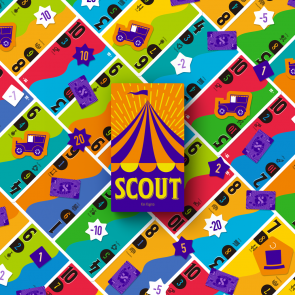Trick taking feels like the mechanism of the moment. One that has its origins in the traditional deck of 52 cards. Now it is on the rise again and Scout from Oink Games had been riding the hype train. I got a chance to try it on my recent Airecon trip and felt compelled to write a review after some time with this most svelte of games. Scout comes from designers Kei Kajino with art and graphics from Rie Komatsuzaki, Jun Sasaki, and Sinc.
Let’s get something out of the way first. Scout has a theme of putting on circus acts and poaching performers from better ones to further your own. It does not come across at all. The theme is totally meaningless, has no bearing on the game, and I didn’t even notice it for most of the first round I played until I wondered why all the cards have names. The original version contained just numbered cards, and honestly I think I would have preferred that.
That aside, let’s look at the game itself. You play Scout over a series of rounds where you are accumulating points by trying to one up the last card(s) played. During a round you might start with a single card played. You can beat that with a sequence of cards, like 2,3 or just a single card of higher value. You can beat sequences by sets of cards, like 4,4, or again by playing a sequence with a higher value or more cards in it. When you play cards its called the ‘Show’ to tie into the loose theme. Any cards you beat are taken as points and placed facedown in front of you.
 Graphic Design is bold and clear
Graphic Design is bold and clear
That sounds straightforward right? Here is the problem. The hand you are dealt at the start of the game can’t be rearranged. Ever. When cards are played they must come from your hand in the order they appear. If you want to play 5,6,7 you can’t pick where those cards come from in your hand. Those cards must be nestled together in that order (7,6,5 works as well). Resisting the temptation to play with your hand of cards is probably going to be the most difficult part of the game.
The other wrinkle is that each card has two values, one at each end of the card. Choose which way up your hand is at the start of the game and then live with your choices.
Until you Scout.
The theme, non-existent as it is, rears its head here. If you can’t beat the previously played card(s), you can instead take one of the cards played and put it in your hand. This is the only time you are allowed to manipulate your hand. When you ‘Scout’ a card it can go anywhere in your hand, in any orientation. This allows you to build sets and sequences out of the seeming randomness of your hand. The disadvantage is whenever you Scout, you give the player whose cards you are taking a point towards victory.
 What are you going to do?
What are you going to do?
Here it is then. Your turn comes. You have cards you can play to beat the last lot played. But should you? You could ‘Scout’ one of those cards to prepare your hand for later, but give points up to a rival. How close can you get to ending the round, by emptying your hand? How close is everyone else? These are the decisions that you will wrestle with every single turn in Scout. It elevates a straightforward game into one of sharp choices. Once per round you can ‘Scout’ and ‘Show’ giving you the ability to pull off some huge moves, but adding another choice to the proceedings.
When the round does end the cards facedown in front of you from winning ‘shows’ are positive points. The points you’ve gained from folk scouting your cards, are also positive. Every card in your hand is negative. Play a round per player and you are done.
At lower player counts it is easier to shut out a round by playing a large ‘show’ that no-one else can beat. If that show is still in play by the time it comes back round to the person who put it down the round immediately ends. That happens less frequently at higher player counts and 4 or 5 players seems to be where the game sits best.
Scout is a game that emerges in play. As you contemplate the immovable object of your hand, the irresistible force of opportunity gives you the means to leverage it. Your hand is a plan waiting for you to figure it out. Working your way around that constantly evolving puzzle is extremely satisfying.
It would be easy to dismiss Scout as a warm-up game for a bigger night of games or a filler game. To be sure it could be either of those things but it is an interesting game in its own right, with a classic card game feel to it. It’s simple to teach with an emergent complexity that everyone will grasp by the end of the first round. It may be the hyped game of the moment, but it deserves to have longevity beyond the BGG hotness.
 Games
Games How to resolve AdBlock issue?
How to resolve AdBlock issue? 


















